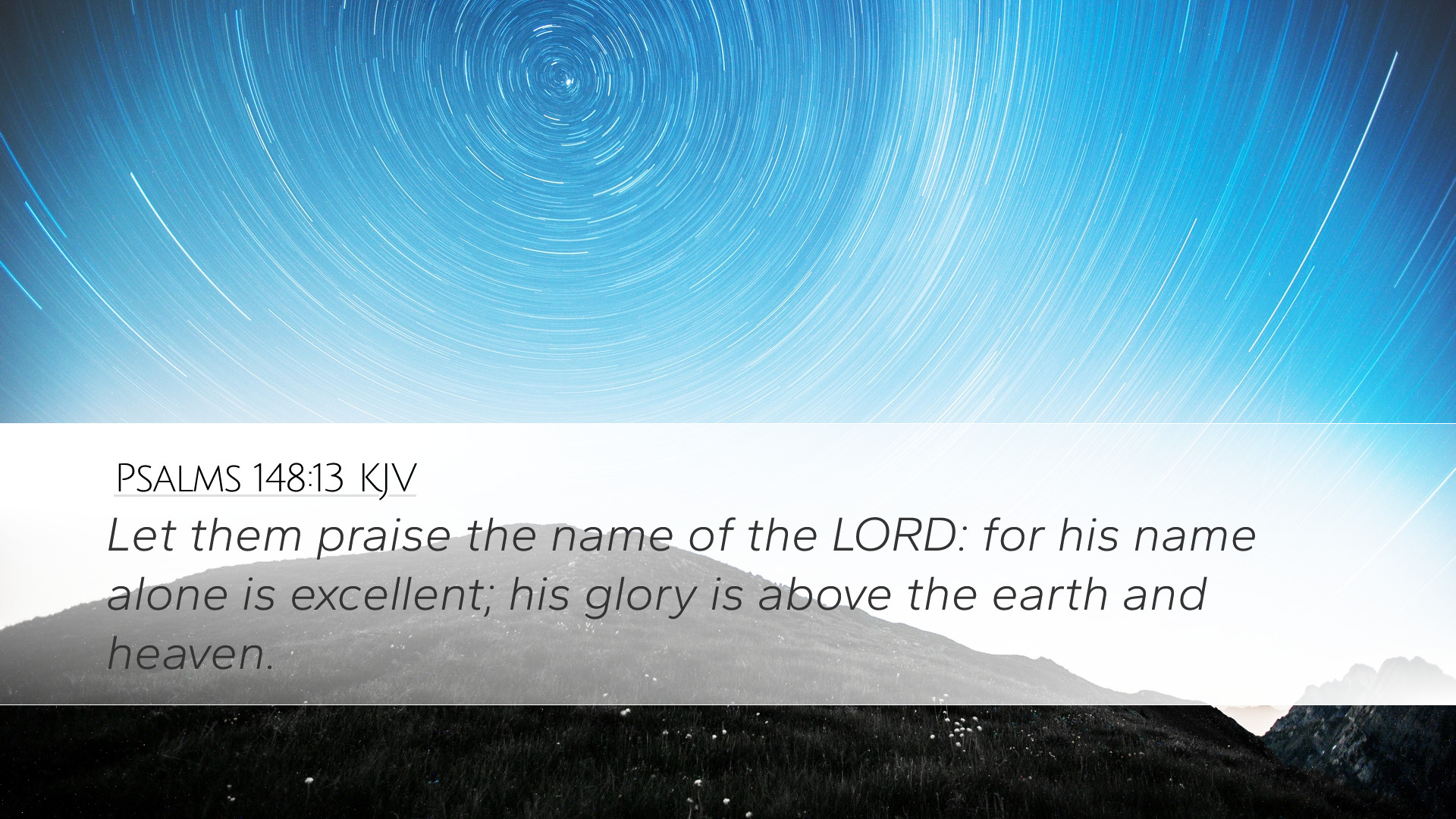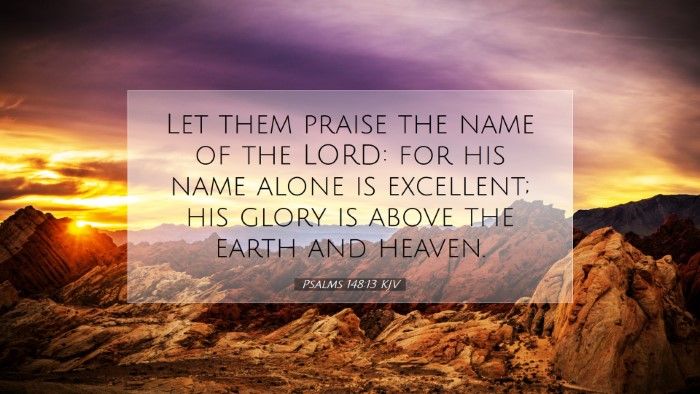Psalms 148:13 - A Commentary
Verse: "Let them praise the name of the LORD: for his name alone is excellent; his glory is above the earth and heaven."
Introduction
This verse serves as a culmination of the psalmist's exhortation for all creation—be it heavenly, terrestrial, or elemental—to engage in the act of praising the Lord. It emphasizes the supremacy of God's name and His unparalleled glory that transcends the earth and the heavens.
Insights from Public Domain Commentaries
Matthew Henry's Commentary
Matthew Henry emphasizes the universality of praise required by God. He notes that both angels and humans are included in this call. The phrase "Let them praise" signifies not only the necessity of worship but also highlights the inherent duty of all creation to glorify the Creator.
Henry reflects on the excellence of God’s name, indicating that it stands above all worldly names and powers. He draws attention to the notion that true worship must come from an understanding of who God is; it is His excellence that invites us to worship Him. The idea that His glory is above all creation also points to the majesty and sovereignty of God, reminding us that nothing in the universe can rival His greatness.
Albert Barnes' Notes on the Bible
Albert Barnes provides additional depth by exploring the attributes highlighted in this verse. He mentions that the name of the Lord, being excellent, is reflective of His nature and attributes—His holiness, wisdom, power, and love, all of which deserve reverence. Barnes emphasizes that the attributes of God inspire awe and warrant a response of praise from all created beings.
Moreover, Barnes notes the duality of God's glory being "above the earth and heaven.” It suggests not only the vastness of God’s presence but also the hierarchical structure of creation, where God exists in ultimate authority over all realms. This should inspire humility in the hearts of believers, knowing that the Creator rules over everything.
Adam Clarke's Commentary
Adam Clarke notes the importance of acknowledging God’s name in the context of praise. He suggests that calling upon the name of the Lord is not merely a verbal affirmation but an act of recognizing His power and authority in our lives. Clarke highlights that the name of God encompasses His entire being and character, which is the focal point of worship.
Clarke adds an exhortative tone, stating that the phrase "his glory is above the earth and heaven" should stir believers to align their priorities towards honoring God above all else. His commentary reflects on how the heavens declare God's glory, affirming the interconnectedness of creation and the Creator. The praise of nature complements human worship, creating a harmonious expression of adoration to the Lord.
Theological Reflections
This verse opens a profound discussion on the theological import of God's name and glory. It underlines the doctrine of God’s transcendence, which is vital for understanding the relationship between God and His creation. The excellence of His name compels believers to consider their response to such greatness.
- Understanding of God's Name: The name of the Lord is an expression of His essence and attributes. Recognizing this can deepen one’s worship experience and foster a more vibrant relationship with God.
- The Act of Praising: Worship is portrayed not just as a ritual but as a fundamental aspect of existence. Every created being is invited to join in this cosmic symphony of praise.
- Hierarchy of Creation: Acknowledging that God’s glory is exalted above all creation invites humility and helps believers to recognize their place within the created order.
Practical Applications
This verse offers significant implications for personal and communal worship. Pastors can draw from these insights to craft sermons that emphasize the greatness of God and the importance of worshiping Him in spirit and truth. Bible students can explore the nuances of God's attributes and engage with the text to deepen their faith.
- Encouragement in Worship: Believers are encouraged to enter worship with a heart that acknowledges God’s excellent name.
- Communal Praise: In congregational settings, fostering an environment where all feel encouraged to participate in worship can reflect the universal call of this psalm.
- Creation's Testimony: Christians should be mindful of how nature glorifies God and let that inspire their worship and lifestyle.
Conclusion
Psalms 148:13 stands as a powerful reminder of the call to worship, centered on the exaltation of God's name and glory. By examining the interpretations of notable commentators, we see a multifaceted understanding of what it means to praise God. As believers, we are called not only to recognize His greatness but to respond through our worship and the way we live our lives.


